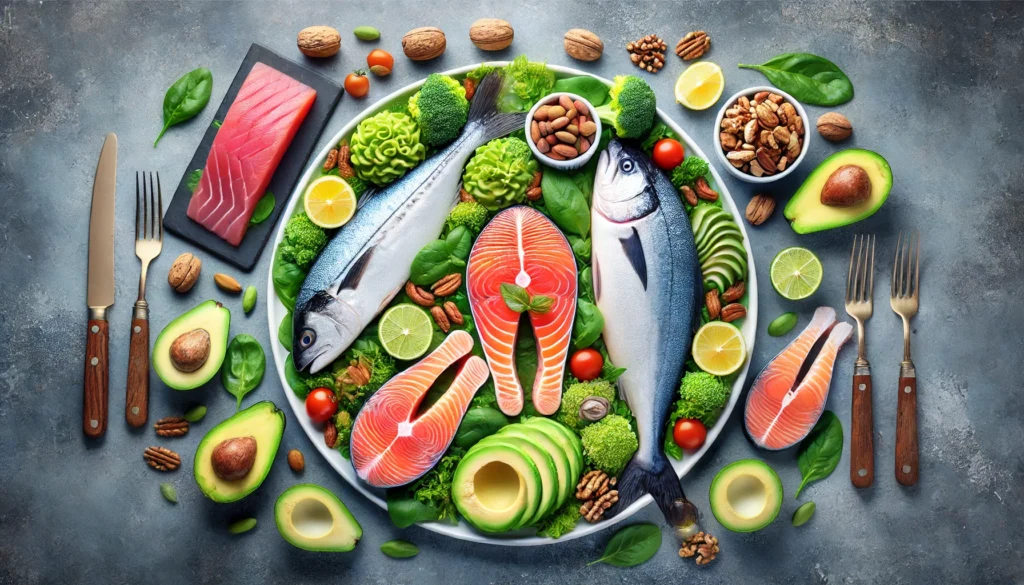In this article, we’ll delve into the science behind fish as a brain food, explore the best types of fish for brain health, and provide practical advice on incorporating more fish into your diet.
You may also like: Memory-Boosting Foods You Should Try Today
The Science Behind Fish and Brain Health
Fish, particularly fatty fish, is an excellent source of omega-3 fatty acids, crucial for brain health. Omega-3s, especially docosahexaenoic acid (DHA), are integral components of cell membranes in the brain. They play a vital role in maintaining neuronal structure and function, which is essential for cognitive processes such as learning and memory.
Omega-3 Fatty Acids: The Brain’s Best Friend
Research has consistently shown that omega-3 fatty acids contribute to better brain function and structure. A study published in the journal Neurology found that higher levels of omega-3s were associated with larger brain volumes in older adults, indicative of better cognitive health. Furthermore, these essential fats have been linked to a reduced risk of neurodegenerative diseases such as Alzheimer’s.
The benefits of omega-3s extend beyond structural support. They also have anti-inflammatory properties that help reduce brain inflammation, a common contributor to cognitive decline. By incorporating more omega-3-rich fish into your diet, you’re providing your brain with the tools it needs to function optimally.
Omega-3s also play a role in mood regulation. Studies have shown that individuals with higher omega-3 intake are less likely to experience depression and anxiety. This is because omega-3s influence neurotransmitter pathways, promoting better communication between brain cells.
DHA and EPA: The Dynamic Duo
DHA and eicosapentaenoic acid (EPA) are the two primary types of omega-3s found in fish. While DHA is crucial for brain structure, EPA is known for its anti-inflammatory effects. Together, they support cognitive health by enhancing synaptic plasticity, which is the brain’s ability to adapt and change throughout life.
Evidence suggests that adequate levels of DHA and EPA can improve focus, attention, and overall mental clarity. These effects are particularly beneficial for students and professionals who require sustained cognitive performance throughout the day.
The synergy between DHA and EPA also contributes to the prevention of cognitive decline. Regular consumption of these omega-3s has been associated with a lower incidence of dementia and other age-related cognitive disorders, making them essential for long-term brain health.
Is Salmon Good for Your Brain?
Salmon, often touted as a superfood, is a prime example of a brain-boosting fish. Rich in DHA, salmon provides the nutrients necessary for maintaining cognitive function. Consuming salmon regularly has been linked to improved memory and a lower risk of developing dementia.
A study in the American Journal of Clinical Nutrition demonstrated that individuals who consumed salmon and other omega-3-rich fish had better cognitive function and slower cognitive decline as they aged. This makes salmon not only a delicious choice but a smart one for long-term brain health.
In addition to its omega-3 content, salmon is also a great source of high-quality protein, which supports neurotransmitter production. Neurotransmitters are chemicals that facilitate communication between brain cells, playing a critical role in mood, memory, and learning.
The Best Fish for Brain Health
While salmon is often highlighted, it’s not the only fish that can benefit your brain. Here are some of the best fish for brain health, each offering unique nutritional profiles:
Mackerel
Mackerel is a fatty fish rich in omega-3s, vitamin D, and selenium. Its high omega-3 content makes it a powerful ally in supporting brain function. Regular consumption of mackerel can help boost memory and overall cognitive performance.
Mackerel is also abundant in vitamin D, which is known to support cognitive health. Vitamin D receptors are present in the brain, and adequate levels of this vitamin have been linked to improved mental function and mood regulation.
Selenium, another nutrient found in mackerel, acts as an antioxidant, protecting brain cells from oxidative stress. This protection is crucial for preventing age-related cognitive decline and maintaining optimal brain health throughout life.
Sardines
Sardines are small but mighty when it comes to brain health. Packed with omega-3s, vitamin B12, and vitamin D, sardines are excellent for maintaining cognitive function. They are also a sustainable choice, making them an environmentally friendly option for brain health.
Vitamin B12 found in sardines is essential for maintaining healthy nerve cells and producing DNA. It also plays a role in preventing brain shrinkage, which is associated with cognitive decline and memory loss.
The high calcium content in sardines supports brain health by aiding neurotransmitter release. This is vital for effective communication between neurons, enhancing cognitive abilities such as learning and problem-solving.

Trout
Trout, particularly rainbow trout, is another omega-3-rich fish that supports brain health. It’s also a great source of vitamin B6, which plays a role in cognitive development and function. Including trout in your diet can contribute to improved memory and brain performance.
Vitamin B6 is involved in the synthesis of neurotransmitters such as serotonin and dopamine, which regulate mood and behavior. Adequate levels of this vitamin are crucial for maintaining mental well-being and preventing mood disorders.
Trout’s rich content of antioxidants helps protect the brain from oxidative damage. This protection is vital for preserving cognitive function and reducing the risk of neurodegenerative diseases like Alzheimer’s.
Historical Context and Current Trends
Fish has been a staple in human diets for millennia, valued for its nutritional benefits long before the science was fully understood. Ancient civilizations, such as the Greeks and Romans, recognized the value of fish for its health benefits. In modern times, the focus on fish has intensified as we seek to optimize brain health through diet.
Ancient Wisdom and Cultural Practices
The ancient Greeks believed fish to be a divine food, often associating it with wisdom and intelligence. Fish was a staple in their diet, and they believed it contributed to mental clarity and philosophical thought.
In Asian cultures, fish has long been considered a symbol of prosperity and health. Traditional diets rich in fish have been linked to longevity and lower rates of cognitive decline in countries like Japan and Korea.
Indigenous communities worldwide have relied on fish as a primary food source for generations. These communities have long understood the health benefits of fish, using it to support cognitive function and overall well-being.
The Rise of Nutritional Science
The 20th century saw significant advancements in nutritional science, leading to a deeper understanding of the role of omega-3s in brain health. Researchers began to uncover the mechanisms by which fish supports cognitive function, solidifying its status as a brain-boosting food.
Epidemiological studies have consistently shown a correlation between fish consumption and improved cognitive health. These findings have fueled public interest in incorporating more fish into the diet as a preventive measure against cognitive decline.
The recognition of fish’s nutritional benefits has led to the development of omega-3 supplements, making these essential fats more accessible to those who may not consume fish regularly.
Sustainable Fishing Practices
Current trends emphasize the importance of sustainable fishing practices to preserve marine ecosystems while still reaping the nutritional benefits of fish. As awareness grows, consumers are increasingly opting for sustainably sourced fish, balancing health benefits with environmental responsibility.
Organizations like the Marine Stewardship Council (MSC) and the Aquaculture Stewardship Council (ASC) provide certifications to ensure fish is sourced sustainably. These certifications guide consumers in making environmentally conscious choices.
The push for sustainability has led to innovations in aquaculture, with fish farms adopting practices that minimize environmental impact. These advancements promise to make brain-boosting fish more accessible to a global audience.
Practical Advice for Incorporating Fish into Your Diet
Tips for Choosing and Preparing Fish
- Opt for Fresh or Frozen: Fresh and frozen fish retain the most nutrients. If fresh fish isn’t available, frozen is a great alternative. Ensuring the fish is well-packaged and stored at the correct temperature is crucial for preserving its quality and nutritional value.
- Check for Sustainability: Look for certifications such as MSC or ASC to ensure your fish is sustainably sourced. Choosing certified fish helps protect marine environments and supports ethical fishing practices.
- Experiment with Cooking Methods: Grilling, baking, and steaming are healthy ways to prepare fish while preserving its nutrients. These methods enhance the flavor without adding unnecessary fats or calories.
- Flavor with Herbs and Spices: Enhance the natural flavors of fish with herbs like dill, parsley, or lemon zest. Using fresh ingredients can elevate the dish while providing additional health benefits.
- Incorporate Variety: Try different types of fish to enjoy a broad range of nutrients. Diversifying your fish intake can prevent dietary monotony and ensure you receive a comprehensive array of vitamins and minerals.
How Much Fish Should You Eat?
The American Heart Association recommends eating fish at least twice a week to reap its health benefits. This can include a variety of fish to ensure a broad intake of nutrients.
Consuming a mix of fatty and lean fish can provide a balance of omega-3s and other essential nutrients. Aim to include at least one serving of fatty fish, such as salmon or mackerel, each week for optimal brain health.
For those who are not fans of fish, omega-3 supplements can be a viable alternative. However, obtaining nutrients from whole foods is generally preferred for its additional benefits, such as protein and micronutrients.

Considerations for Pregnant Women
While fish is beneficial, pregnant women should be mindful of mercury levels in certain fish. Opt for low-mercury options like salmon and sardines, and consult with a healthcare provider for personalized advice.
Pregnant women can safely consume up to 12 ounces of low-mercury fish per week. This intake supports fetal brain development and provides essential nutrients for both mother and child.
It’s important to avoid high-mercury fish such as shark, swordfish, and king mackerel during pregnancy. These fish can pose risks to fetal development and should be replaced with safer alternatives.
Future Implications and Biohacking
As research continues to unveil the myriad benefits of fish for brain health, the interest in optimizing cognitive performance through diet will likely grow. The biohacking community, in particular, is keen on leveraging fish consumption as part of a broader strategy to enhance brain function, focus, and mental clarity.
The Role of Biohacking in Cognitive Enhancement
Biohackers seek to optimize their physical and mental performance through diet, lifestyle, and technology. Fish, with its cognitive benefits, fits neatly into this paradigm as a natural means of boosting brain function.
Incorporating fish into a biohacking regimen can enhance focus, memory, and mental clarity, aligning with the community’s goals of achieving peak cognitive performance. Biohackers may also explore supplements and nootropics that complement fish-based omega-3 intake.
The biohacking community’s interest in personalized nutrition could lead to tailored dietary plans that maximize the brain-boosting effects of fish. This customization could include specific fish recommendations based on individual health profiles and cognitive goals.
Advancements in Aquaculture and Accessibility
Looking ahead, advancements in aquaculture and sustainable fishing practices promise to make brain-boosting fish more accessible to a global audience, ensuring that future generations can enjoy both cognitive benefits and environmental sustainability.
Innovations in aquaculture aim to increase fish production while minimizing ecological impact. Sustainable practices ensure that fish remains a viable food source without depleting marine resources.
As access to fish improves, education on its health benefits can drive increased consumption worldwide. Public health initiatives may promote fish as a key component of a balanced diet, supporting cognitive health on a broader scale.
The Future of Cognitive Health and Nutrition
The future of cognitive health is likely to involve a greater emphasis on nutrition as a preventive and therapeutic strategy. Fish, with its proven benefits, will remain a cornerstone of diets aimed at supporting mental well-being.
Ongoing research may uncover new insights into the specific mechanisms by which fish enhances brain function. These discoveries could inform dietary guidelines and public health policies promoting fish consumption.
As society increasingly values cognitive performance, fish will continue to play a pivotal role in dietary strategies aimed at achieving mental acuity and longevity.
Conclusion
Incorporating fish into your diet is a practical and effective way to boost brain health. With its rich supply of omega-3 fatty acids, essential vitamins, and minerals, fish offers a natural means of enhancing cognitive function, reducing the risk of neurodegenerative diseases, and supporting overall mental well-being.
By choosing the right fish and preparing it thoughtfully, you can unlock the full potential of this brain-boosting superfood. Whether you’re a health and wellness coach, a science journalist, or a biohacker, the benefits of eating fish are clear—it’s time to make fish a staple in your diet for a healthier, sharper mind.

The Personal Journey of Embracing Fish
For many, incorporating fish into their diet is a journey of discovery, exploring new flavors and cooking techniques. This journey not only enriches the palate but also contributes to a healthier lifestyle and improved cognitive function.
As you experiment with different types of fish and preparation methods, you’ll likely notice the positive impact on your mental clarity and overall well-being. This personal transformation can serve as motivation to continue embracing fish as a dietary staple.
Sharing your experiences with others can inspire them to explore the brain-boosting benefits of fish. By spreading awareness, you contribute to a broader understanding of the importance of nutrition in cognitive health.
Further Reading:
New Study Shows That Fish Really Is Brain Food
Regular Fish Consumption and Age-Related Brain Gray Matter Loss
Important Note: The information contained in this article is for general informational purposes only, and should not be construed as health or medical advice, nor is it intended to diagnose, prevent, treat, or cure any disease or health condition. Before embarking on any diet, fitness regimen, or program of nutritional supplementation, it is advisable to consult your healthcare professional in order to determine its safety and probable efficacy in terms of your individual state of health.
Regarding Nutritional Supplements Or Other Non-Prescription Health Products: If any nutritional supplements or other non-prescription health products are mentioned in the foregoing article, any claims or statements made about them have not been evaluated by the U.S. Food and Drug Administration, and such nutritional supplements or other health products are not intended to diagnose, treat, cure, or prevent any disease.


